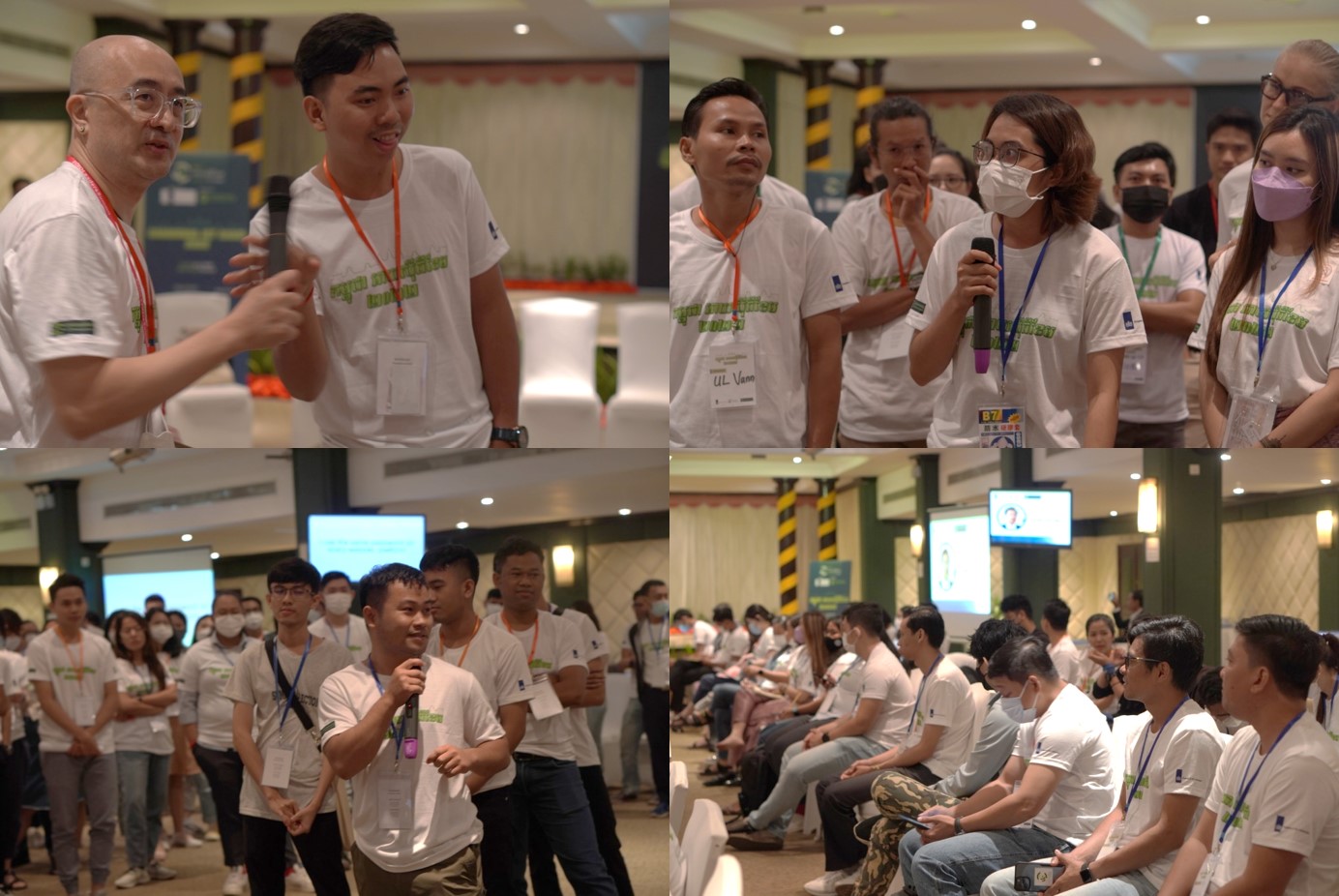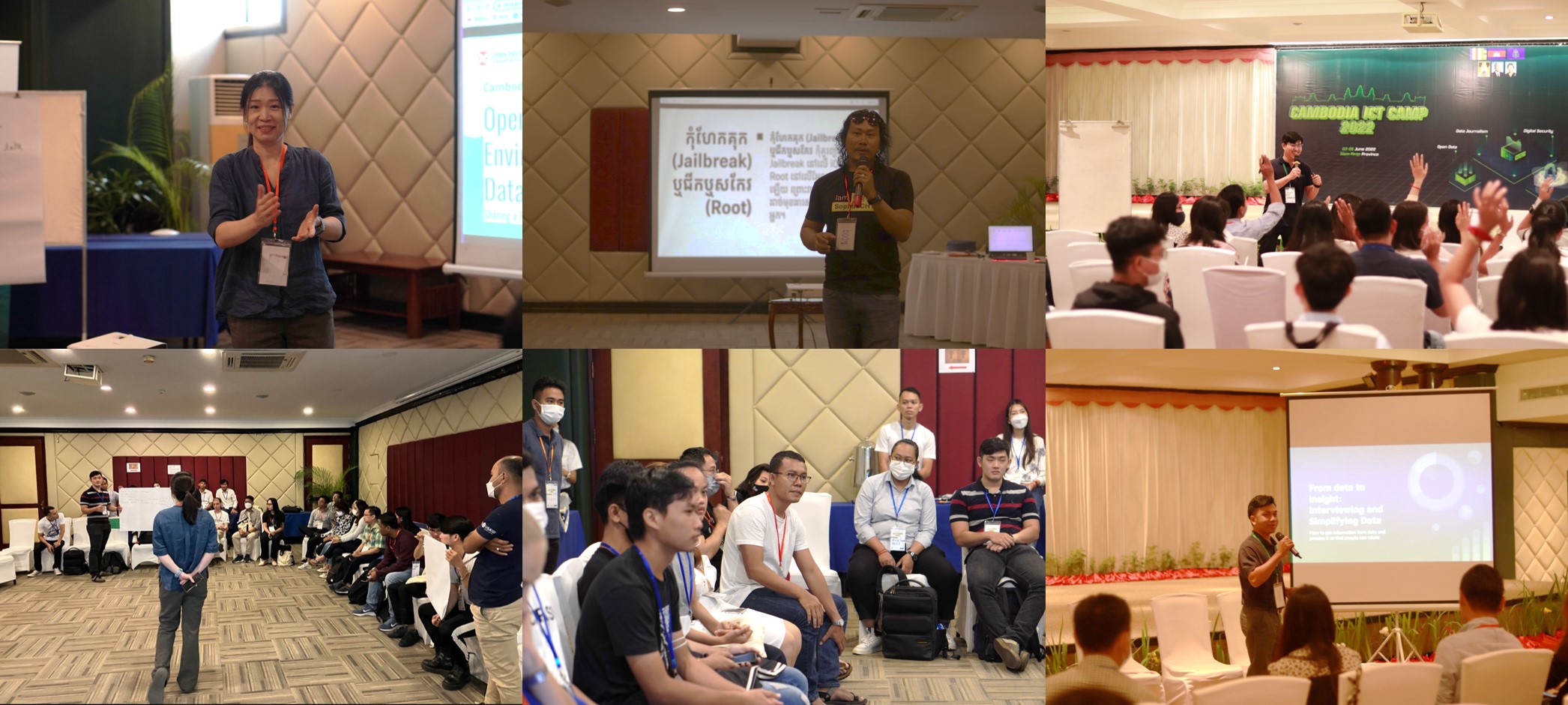Three-day Cambodia ICT Camp marked the successfulness of the whole event in Siem Reap

The final day of Cambodia ICT Camp 2022 has finally arrived. Participants are fully packed with ideas, knowledge, and understanding for the past two days of intensive training sessions from our potential speakers whose expertise varies and differs. Although it is the last day of the camp, the intensity remains still or even more. For the whole program from 23rd to 25th of June, there were a total of 155 participants, including 61 females from different backgrounds such as but not limited to media, journalists, academics, professionals, researchers, university students, and more. For the three days of intensive training, there were 45 workshop sessions (four online) and two-panel discussions led by 17 national speakers and 14 international speakers.
After breakfast, all participants came to the ballroom on the fifth floor to assemble for an ice-breaking session and reflection on the last two days, especially the day before. The previous day accommodated 21 sessions, including a sharing session and a panel discussion. Like the other two days, participants were invited to attend any session they were interested in. Like the first two days, all sessions are conducted separately in three different breakout rooms with various interesting topics under the same themes: Data Journalism, Digital Security, and Open Data. In the main room on the fifth floor, the sessions were conducted dually, both online and physically face-to-face.

In-room 1, seven sessions for seven topics were packed. The topics are Data Visualization, Using data science to improve public services, and Natural language processing (NPL). After lunch, four more sessions followed up. These are Data governance in ASEAN and its implication to Cambodia, enabling heterogeneous open data with Internet-of-Things, Data Trust, and Towards National Spatial Information Infrastructure.
Room No. 2 is packed with the same number of insightful topics such as Myanmar Cybersecurity Draft Law, Political participation in post-authoritarian regimes in the digital age: insights from Cambodia, and Data-Centric Digital Rights in Cambodia. After lunch, we had topics such as Mobile Journalism, WordPress Security for Beginners, and Foreign Investment Mapping.

Sessions in the main hall are such as plus and beyond – Open source licenses, Creative Commons, and how to use them; Mobile Journalism; Impacts of Digital Rights Restriction on Press Freedom and Active Citizen’s Freedom of Expression on the Internet; a sharing session on the use of VPN; Podcasting; Data-driven storytelling; and a Discussion: Digital Landscape in Mekong Region.
During the three days, based on the observation, the most engaged and active sessions are split and detailed as follows:
On the first day, the most active sessions are the Panel discussion: MyData4Children by Dixon Sui, Jean Queralt, and Nhem Piseth; Digital Security Audit by Nget Moses and The Glass Room, Data Detox Kit and digital enquirer Kit by Safa and Mohamad.
In-room 1, Panel Discussion: My Data4Children. After the MyData4Children Workshop, a special session in which only children were allowed to be, there was a panel discussion on MyData4Children. But this time, parents and participants were in the breakout room to discuss children’s protection and guidance and the challenges that parents face regarding the children’s behavior regarding the use of the internet.

In room 2, the speaker started by asking participants several questions related to digital security audits. Then, several participants answer the questions, and the speaker briefly answers more detail about the participants. The speaker stated that the Digital Security Audit is significant since it assists in determining whether there is any number of security issues and threats to the company’s business and technical operations. It also improves firm security by detecting vulnerabilities and threats and highlighting weak linkages and high-risk activities.
In the main hall, the most engaging session was on the topic of the Glass Room, Data Detox Kit, and digital enquirer Kit presented by Safa and her colleague Mohamad. The atmosphere was great and interactive, as many participants volunteered to share their opinions. City spotting is the activity in which participants involve actively by going closer to the presentation screen to try to spot the clues and guess the city shown.
On the second day, the most exciting sessions are Open Environmental Data by Saowalak Jinjungvisut, Digital Hygiene Practice by Chy Sophat, and Interviewing and Simplifying Data by Mardy.
In-room 1, Ms. Saowalak Jingjungvisut presented to her 35 participants, which included 13 females, on the topic of “Open Environmental Data,” who all showed great interest in the area. The session discussed the challenges of accessing free and open data in environmental areas, including data on air pollution and clean water. A significant challenge to open environment data: access to data was highlighted and addressed. In addition, she illustrated research methodologies and the critical research findings related to environmental data to conclude her presentation.

In-room 2, Sophat addressed the audience on digital hygiene practice. During his presentation, he encouraged the audience to participate in the discussion by sharing their experiences using mobile phones and emails and their privacy protection.
In the main hall, Mardy began with simple questions asked to the audience and received answers. The session was also active because the speaker was able to entertain and interact with the participants.
On the last day, the most engaging sessions are Using Data Science to Improve Public Services by Chhorn Chhayyuth; Mobile Journalism by Le Nguyen; Plus and Beyond – Open source licenses, Creative Commons, and how to use them by Chiang Poren; and Impacts of Digital Rights Restriction on Press Freedom and Active Citizen’s Freedom of Expression on the Internet by Him Khortieth.
In-room 1, using data science to improve public services by Chhorn Chhayyuth. The speaker first started the session by showing the participants a few graphs and asking them to analyze the graphs. After finishing the presentation, he asked the participants 4 questions via Early Grade Reading Assessment (ERGA) related to the grade 1 and 2 students’ reading abilities from 2018 and 2019 data. The session then turned into Q & A and a sharing session by the participants.

In both room 2 and the main hall, the session presented by Mr. Le Nguyen, a Multimedia Producer/Journalist on the topic of Mobile Journalism, was very active. His session accommodated a total of 27 participants in both rooms. Mr. Nguyen explained mainly the technical issues of using mobile phones to capture pictures and videos for reporting purposes.
In the main hall, the day began with an online session from Mr. Chiang Poren, a Digital law Researcher and a Software Developer. A total of 11 participants attended this session. His session mainly covers licensing and copyright. He expresses the importance of using the right license, giving credit to the original author, and giving copyright to the original source. Poren then explains the importance of local and international law on the internet. To begin with, he highlighted the importance of copyright law. He stated that most copyright laws protect copyright after they die, depending on a specific country’s law. The participants were assembled outside the room for a fifteen-minute coffee break.
The session about the Impacts of Digital Rights Restriction on Press Freedom and Active Citizen’s Freedom of Expression on the Internet was also interesting. Before getting started, the substitute presenter, Mr. Him Khortieth invited Mr. Nop Vy, the Executive Director of Cambodia Journalist Alliance Association (CamboJA), to deliver a short remark. He addressed the motive behind the creation of CamboJA as a journalist alliance to support all the journalists in Cambodia. CamboJA also does research work in collaboration with Open Development Cambodia (ODC) on press freedom and online freedom of expression. Since the government has been working on such laws, it is essential to conduct this research to study the positive and negative impacts of regulations, and the findings will be presented by the research consultant.

The whole camp event finished with a wonderful Farewell Dinner. All participants, volunteers, organizing committee, speakers, and guests were very cheerful to cherish the moments spent together for these past few days on the historical land of Siem Reap province. A concluding remark was delivered by the executive director of ODC, Mr. Thy Try to officially recap and end the event.



